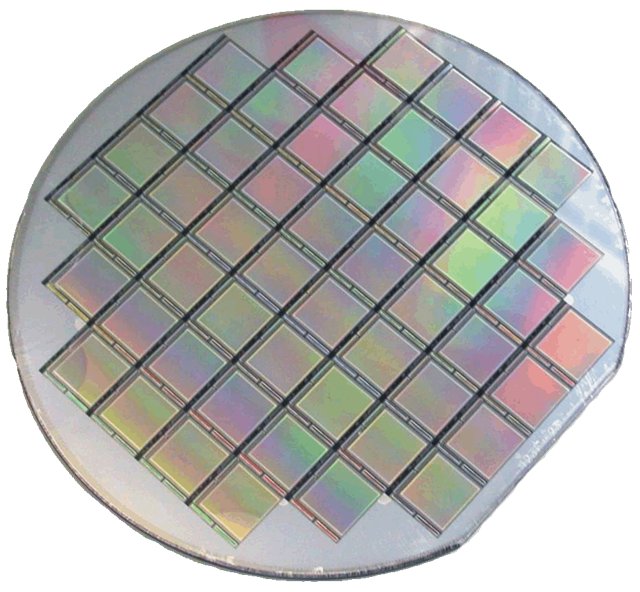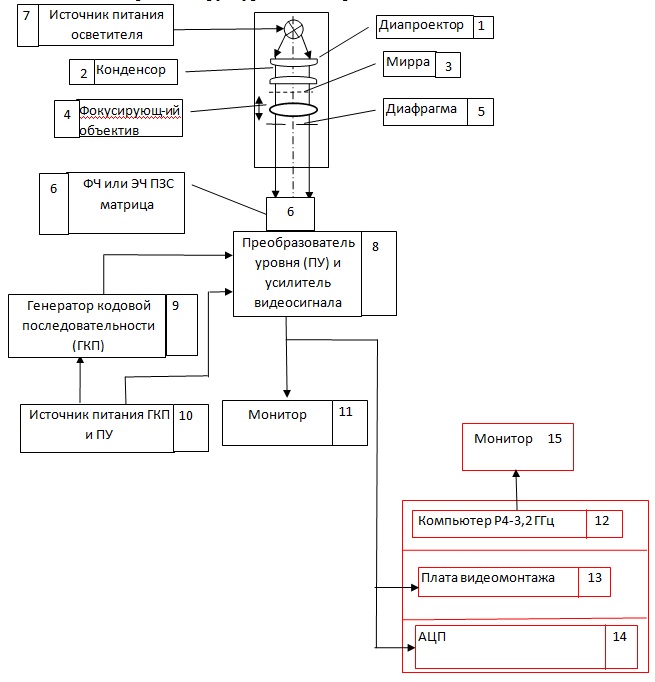Hardware and software system for measuring the photoelectric characteristics of a CCD
By a strange coincidence, I have been engaged in measuring various instrument parameters for quite some time. At first it was the output control of MEL-2 and MFLEM-1 stands developed at the Department of Thermal Power Engineering in MIREA (Tu), then monitoring the parameters of the instruments on the plates, and most recently I dealt with the issue of monitoring the parameters of FPSU (charge-coupled photosensitive devices) at the enterprise FGUP NPP "Pulsar".

Under the cut, I will tell you about how the automation of parameter measurements was carried out.
Earlier at the enterprise measurements were carried out using television and oscillographic methods. For rulers (roughly speaking, one row of the matrix) such methods were simple and met the requirements of accuracy, etc.
But then matrices began to appear. For the first matrices of small resolution, such methods still somehow fit, although the oscilloscope could select only one row of the matrix, it became more difficult to count, longer, and so on. For example, in order to calculate the average quadratic noise voltage, one had to have the voltage value of each photosensitive element, and from 50 to 128 (according to GOST) frames were required, after which these data were still required to be processed. All this took a lot of time, and in complex calculations it was easy to make a mistake.
Therefore, it was decided to move to automated digital measurements.
At the moment I no longer work on the “Pulsar” and unfortunately, I have not kept the photos of the stand that was used for these measurements. However, I am ready to show the layout of the stand:

In essence, a simple device. Conditionally divided into an optical mode setting unit, an electric mode setting unit and a measurement unit, including a computer and an ADC.
The aim of the whole event was to write software for this stand, which would allow quickly, simply and efficiently measuring the basic photoelectric characteristics of the matrix FPSS.
')
I will not bore readers with quests, mathematical apparatus and other things; I will describe only the most important thing.
The list of characteristics, their description, formulas are in GOST 28953-91 "Photosensitive devices with charge transfer. Methods of measuring parameters "
As the ADC, the L-Card E20-10 module was used (for the simple reason that it, firstly, was already available in the laboratory, and secondly, was cheap enough).
Software was implemented on C ++ builder
All the tasks before me were completed.
In this article I tried very briefly to acquaint you with my experience of switching from photoelectric parameters from analog to digital measurements, I have a very limited budget and a minimum of programming knowledge. In general, I think the work was done well, because All goals have been achieved, but at the same time, the prospects for this method are visible - you can optimize algorithms, add other ADC modules, measure other instrument parameters, move to full automation using light control and focusing by the program itself.

Under the cut, I will tell you about how the automation of parameter measurements was carried out.
Start
Earlier at the enterprise measurements were carried out using television and oscillographic methods. For rulers (roughly speaking, one row of the matrix) such methods were simple and met the requirements of accuracy, etc.
But then matrices began to appear. For the first matrices of small resolution, such methods still somehow fit, although the oscilloscope could select only one row of the matrix, it became more difficult to count, longer, and so on. For example, in order to calculate the average quadratic noise voltage, one had to have the voltage value of each photosensitive element, and from 50 to 128 (according to GOST) frames were required, after which these data were still required to be processed. All this took a lot of time, and in complex calculations it was easy to make a mistake.
Therefore, it was decided to move to automated digital measurements.
Stand Description
At the moment I no longer work on the “Pulsar” and unfortunately, I have not kept the photos of the stand that was used for these measurements. However, I am ready to show the layout of the stand:

In essence, a simple device. Conditionally divided into an optical mode setting unit, an electric mode setting unit and a measurement unit, including a computer and an ADC.
Formulation of the problem
The aim of the whole event was to write software for this stand, which would allow quickly, simply and efficiently measuring the basic photoelectric characteristics of the matrix FPSS.
')
Decision
I will not bore readers with quests, mathematical apparatus and other things; I will describe only the most important thing.
The list of characteristics, their description, formulas are in GOST 28953-91 "Photosensitive devices with charge transfer. Methods of measuring parameters "
As the ADC, the L-Card E20-10 module was used (for the simple reason that it, firstly, was already available in the laboratory, and secondly, was cheap enough).
Software was implemented on C ++ builder
Results
All the tasks before me were completed.
- It was written software that allows you to measure a dozen basic parameters of the matrix FPSS. And there are no restrictions on the number of photosensitive cells in the device - it can be a ruler of 128 points, and the matrix is more than 500 by 500.
- Significantly increased the speed of measurement. Now all parameters, except for one (average square noise voltage), are measured in fractions of a second.
- The software part of the complex is user friendly and does not require staff training. When the program starts, it automatically connects to the ADC module, and then reports the readiness and suggests choosing the necessary parameters and properties (for example, whether to build a histogram of the output signal). Then the program starts the measurements, prompting the user to adjust the instrument illumination (this is necessary in cases when the output signal and the dark signal are measured sequentially, the saturation voltage), and then a print report in Microsoft Word format is opened.
- Improved accuracy of measurements.
Conclusion
In this article I tried very briefly to acquaint you with my experience of switching from photoelectric parameters from analog to digital measurements, I have a very limited budget and a minimum of programming knowledge. In general, I think the work was done well, because All goals have been achieved, but at the same time, the prospects for this method are visible - you can optimize algorithms, add other ADC modules, measure other instrument parameters, move to full automation using light control and focusing by the program itself.
Source: https://habr.com/ru/post/129370/
All Articles